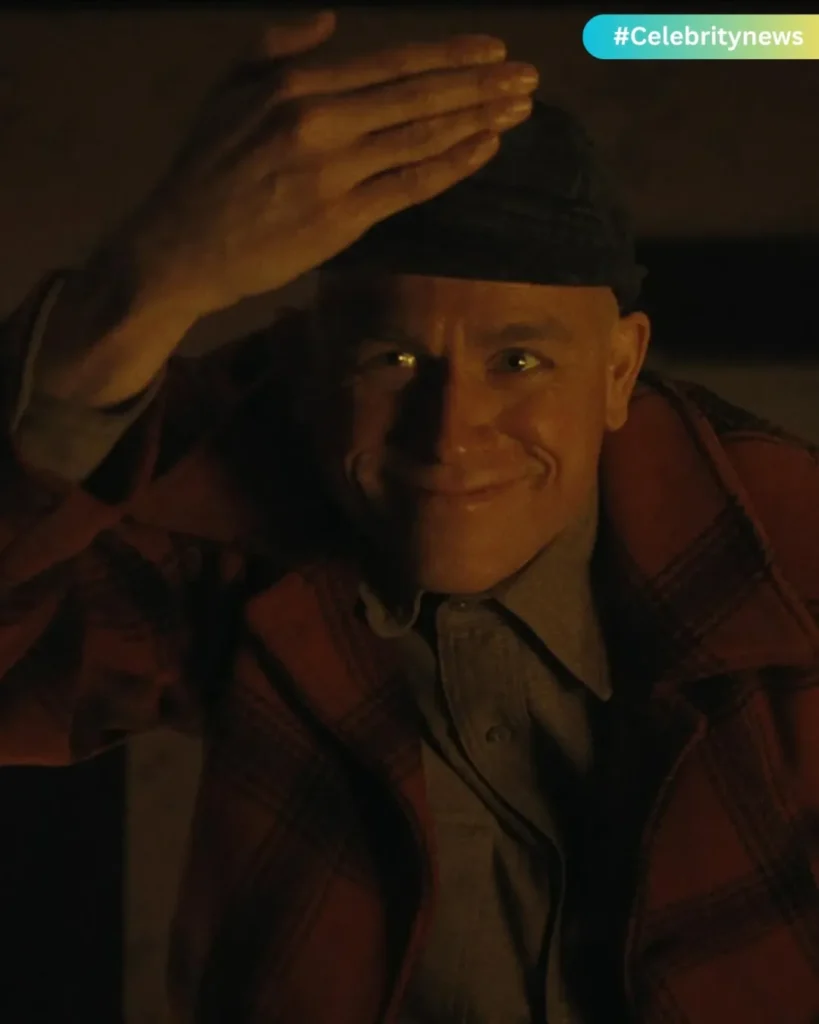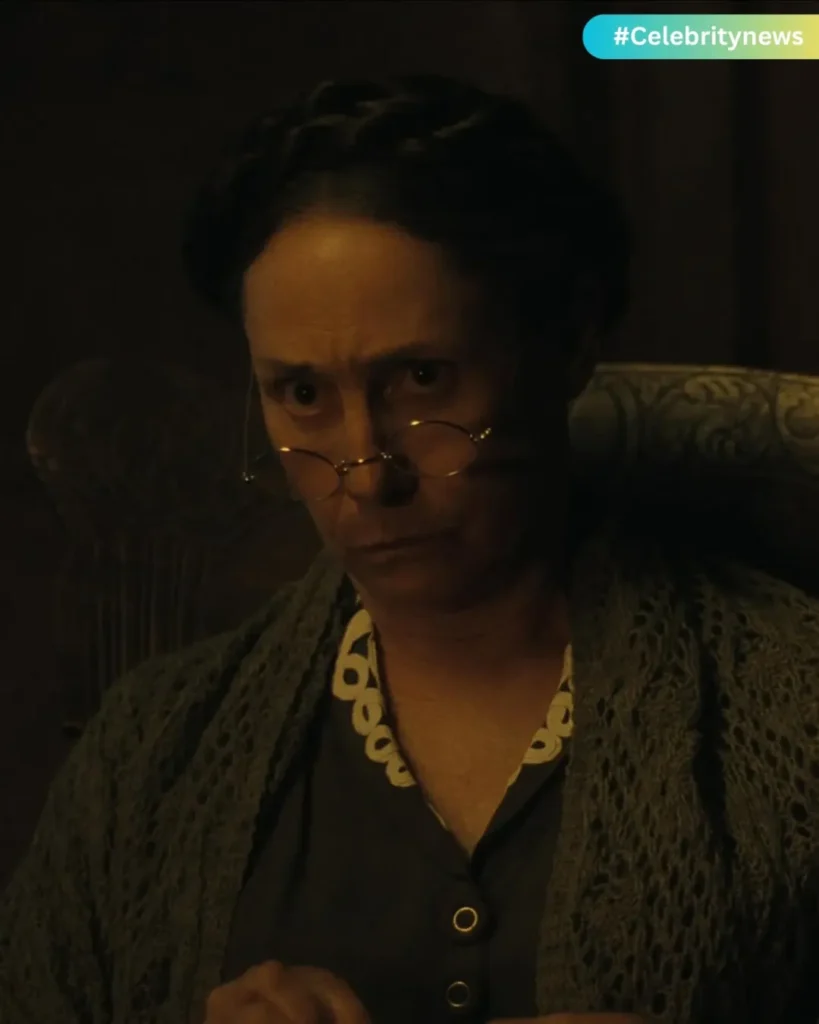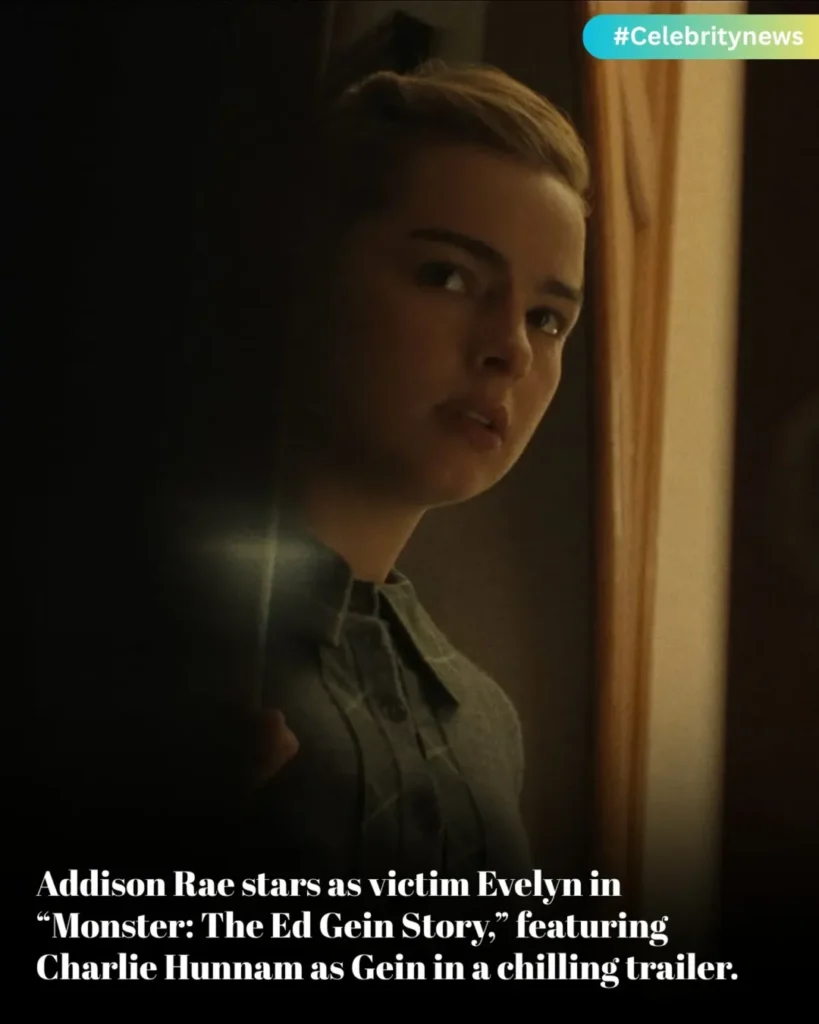A New Monster Walks Into Frame
When the trailer for Monster: The Ed Gein Story ignited the internet, it felt like a jolt: whispers of gasps, shocked reactions, and a collective chill. The familiar bones of true‑crime fascination collided with new faces and bold casting. At its center, Addison Rae—best known for sunny TikTok charm—takes on the role of Evelyn, a young babysitter whose fate becomes entangled with the legend of Ed Gein. Opposite her, Charlie Hunnam transforms into the notorious killer, shedding nearly 30 pounds to adopt Gein’s gaunt physique.
The teaser doesn’t shy away from horror or ambiguity. Gein’s gaze meets the camera. He steps into the skin of his victims. And he tells us brutal truths: “You’re the one who can’t look away.” In less than two minutes, the trailer carves a world of shadows, obsession, and warped interiority.
Addison Rae as Evelyn: Innocence Torn Apart
For Riley Rae (as she’s sometimes credited), this role marks a striking departure from her past screen persona. Evelyn is not a side note. She is focus—and vulnerability. Rae shared that though Evelyn’s ultimate fate is harrowing, playing her involved deep preparation, particularly because the real Evelyn Hartley remains shrouded in mystery. There’s no definitive public record tying Gein to her disappearance. That blank space granted Rae interpretive room—and risk.
In the trailer, we glimpse her tied to a chair, stripped of safety, framed by a darkness she cannot outrun. Rae describes her first day on set: roller skating in period costume, an odd levity before descent. That contrast haunts. Evelyn, as Rae conceives her, is not just a victim—but a mirror to the terror that erupts when innocence meets pathological obsession.
Editing between Gein’s flickering psychosis and Evelyn’s fragile life, the series asks: how far does desire warp reality? And how irrevocable is the cost when lines blur?
Charlie Hunnam’s Ed: Quiet, Unsettling, Magnetic
Hunnam’s leap into the mind of Ed Gein is the kind of performance that demands both empathy and revulsion. Gone is the swagger of previous roles; here, he brings a spectral fragility. Observers have noted how he sheds weight not just physically but in spatial presence—avoiding large gestures, inhabiting corners, moving as if afraid.
Gein’s relationship with his mother, Augusta, forms the scaffolding of his pathology. He crafts human artifacts—skulls, masks, flesh‑woven items—as attempts at remaking self, remaking relation, remaking his mother. In the trailer, when Hunnam peels away his own skin for another’s, it’s not just horror. It’s reclamation. It’s identity twisted into worship.
He breaks the fourth wall, side‑stepping voyeurism and implicating us. “You’re the one who can’t look away.” We are no longer spectators. We are witnesses, participants, culpable in our fascination.
Between Fact & Fiction: Walking the Line

The creators of Monster have long played in the gray zones of true crime. Here, they admit to dramatization. Evelyn’s case—disappearance in 1953—remains officially unsolved. Gein denied involvement. Yet the series makes Evelyn central. It gives form to how rumor, fear, and storytelling swirl together.
Blending verifiable horrors with speculative threads, the show traffics in psychological realism more than documentary truth. The catacombs of Gein’s farm, his mother’s specter, the simmering domestic violence—all are dialed to Gothic extremes. But the effect is not cheap shock. It’s that uneasy tension between real history and invented narrative.
Evelyn’s death is fictionalized with deliberate cruelty: a hammer, a cage, the echo of maternal absence. In the show’s version, there is confrontation, confession, silence. But in real life, we have only empty records, missing pieces, and lasting questions.
Anatomy of the Trailer: Horror as Invitation
The trailer’s visual language is its own beast. Close‑ups of masked faces. Flickering film grain. A dance in dim light. Gein pulling items from drawers. Evelyn in half shadow, in frantic motion. Sound design that alternates whispers and absence.
The aesthetic references horror icons: Psycho, Texas Chain Saw Massacre, Silence of the Lambs, all haunted by Gein’s macabre real crimes. The trailer nods to this legacy, even as it pushes its own tone: intimate horror, less about gore than what the mind can’t escape.
When Gein stares at the camera, the frame trembles. He’s both subject and narrator, predator and mirror. In that moment, the viewer becomes part of the narrative. The line between looking and being looked at blurs.
Expectation & Unease: Anticipation in the Dark
The casting of Rae drew immediate attention. Some questioned whether a social media figure could carry a role steeped in trauma. But the risk is part of the invite. She brings innocence and rich contrast to Gein’s cruelty. The collision drives the drama.
Meanwhile, Hunnam’s reservation about playing such darkness was vocal. He called it risky, even possibly a mistake. Yet his immersion, his physical transformation, his refusal to render Gein as a monster without damage—those choices suggest not sensationalism but wrestle.
As we enter October, when true crime blooms in public appetite, this chapter feels urgent. Not for shock but for reflection. On violence, grief, taboo, the monsters we imagine—and those we cannot look away from.
The Legacy & the Haunt

Ed Gein’s crimes echo beyond his buried victims. He shaped cinematic tropes, archetypes of fear, the skin‑masking iconography. By inserting Evelyn into that lineage, the series restores a human face to what is often mythologized. The brightest light often comes from the darkest corners.
Rae’s Evelyn is a stand‑in for all unknown victims—those whose stories are lost, disputed, silenced. Her voice, however faint, becomes urgent in her absence.
Hunnam’s Gein becomes not only the monster we know but the wounded soul inside the shell. He is framed by silence, by isolation, by impossible familial devotion. The show doesn’t make him excusable. It makes him legible.
In This Monster’s Shadow, We Unsettle
Addison Rae and Charlie Hunnam don’t simply play roles in Monster: The Ed Gein Story. They animate a collision: youth and ruin, curiosity and violence, myth and flesh. The trailer is not just a teaser. It’s a warning. A dare. A whispered invitation to look closer.
Evelyn’s last scream. Gein’s secret chambers. The mother’s ghost. The masks. The skin. The mirror. The question: when you peek into darkness, does darkness peek back?
When the series premieres October 3, it will demand more than attention. It will demand reckoning. Not of facts only, but obsession. Not of monsters only, but the people they failed. And in that reckoning, perhaps we see Evelyn not as victim only—but voice.

